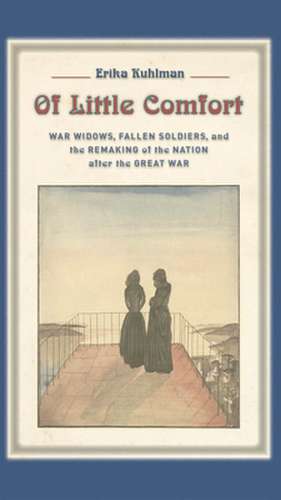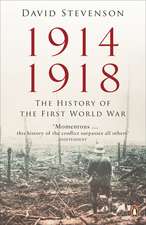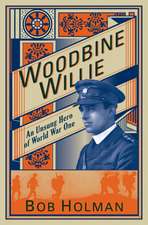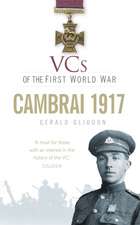Of Little Comfort – War Widows, Fallen Soldiers, and the Remaking of the Nation after the Great War
Autor Erika Kuhlmanen Limba Engleză Hardback – 18 mar 2012
Preț: 429.75 lei
Nou
Puncte Express: 645
Preț estimativ în valută:
82.24€ • 85.34$ • 68.74£
82.24€ • 85.34$ • 68.74£
Carte tipărită la comandă
Livrare economică 17-31 martie
Preluare comenzi: 021 569.72.76
Specificații
ISBN-13: 9780814748398
ISBN-10: 0814748392
Pagini: 236
Dimensiuni: 159 x 235 x 23 mm
Greutate: 0.44 kg
Editura: MI – New York University
ISBN-10: 0814748392
Pagini: 236
Dimensiuni: 159 x 235 x 23 mm
Greutate: 0.44 kg
Editura: MI – New York University
Recenzii
"This is a path-breaking study, filling a major gap in our understanding of the way the wounds of war were inscribed on women's lives for decades after the Great War. Essential reading for all those drawn in increasing numbers to the Ur-catastrophe of the 20th century." -Jay Winter,Yale University"In this insightful and well-researched study, Erika Kuhlman refocuses our analytical gaze at the Great War through the lens of widows views and experiences and by examining how nation-states attempted to use widows to militarize and nationalize the war and post-war years. Widows found empty promises, insufficient support and a less-than reciprocal citizenship from nations eager to cast them as symbols of national sacrifice and proper womanhood. Some cooperated with national plans but others challenged state-sponsored programs and definitions of their womanhood and citizenship. Some transcended the boundaries of the nation-state by identifying with other women as widows through transnational identities and activism. A particular strength of Kuhlmans work is her comparative analysis of widowhood and the Great War across national experiences and her identification of the ways that widowhood became a catalyst for some women to challenge nationalism and militarism, a process that continues today." Kimberly Jensen, Western Oregon University "Moving seamlessly from comparative history to transnational history, this book offers a new model of scholarly analysis. It demonstrates the vitality of the new transnational movement in historical studies and shows why womens history is in the vanguard of that movement." Kathryn Kish Sklar, Distinguished Professor of History, State University of New York, Binghamton
"This is a path-breaking study, filling a major gap in our understanding of the way the wounds of war were inscribed on women's lives for decades after the Great War. Essential reading for all those drawn in increasing numbers to the Ur-catastrophe of the 20th century." -Jay Winter,Yale University "In this insightful and well-researched study, Erika Kuhlman refocuses our analytical gaze at the Great War through the lens of widows' views and experiences and by examining how nation-states attempted to use widows to militarize and nationalize the war and post-war years. Widows found empty promises, insufficient support and a less-than reciprocal citizenship from nations eager to cast them as symbols of national sacrifice and proper womanhood. Some cooperated with national plans but others challenged state-sponsored programs and definitions of their womanhood and citizenship. Some transcended the boundaries of the nation-state by identifying with other women as widows through transnational identities and activism. A particular strength of Kuhlman's work is her comparative analysis of widowhood and the Great War across national experiences and her identification of the ways that widowhood became a catalyst for some women to challenge nationalism and militarism, a process that continues today." Kimberly Jensen, Western Oregon University "Moving seamlessly from comparative history to transnational history, this book offers a new model of scholarly analysis. It demonstrates the vitality of the new transnational movement in historical studies and shows why women's history is in the vanguard of that movement." Kathryn Kish Sklar, Distinguished Professor of History, State University of New York, Binghamton "In this concise yet wide-ranging study, Kuhlman traces the many ways in which war widows became a central locus, highly contested cipher, and strategic tool for modern politics. Kuhlman has written an interesting new contribution to the history of women and nations at war. Replicating the tensions between the home and war front, war widows became the locus of a debate as to whether it was the soldiers or their families who suffered most from the war. Insofar as women seemed to accept the loss of their loved ones, at least in public, recognizing them as war widows served to reinforce the dominant consensus in support of the war effort. Kuhlman's fascinating study reminds us once again of how the Great War marked a new stage in the development of modern politics and the politicization of women's everyday lives."--Drew Bergerson, University of Missouri "Erika Kuhlman's thoughtful, carefully researched, and often quite moving book delves into a poorly understood aspect of World War I and its aftermath: the experiences of millions of war widows whose husbands fell victim to what at the time was the deadliest war in human history. Kuhlman shows that widowhood belongs at the center of any comprehensive history of warfare and peacemaking, as widows' lives can offer rich insights into the nature of the home front and of the battlefront experience alike."--Drew Flanagan, Brandeis University "Of Little Comfort is the story of war and its impact on women. In telling women's stories, author Erika Kuhlman makes it clear that it is impossible to understand war without seeing those larger stories: war is about individuals, both the men who fought and the women who didn't but who suffered nonetheless... As someone who studies women and conflict in the contemporary period I found this to be a fascinating historical study for the context it provided. It is a history of two societies, but primarily it is a story of women who are often overlooked when the larger stories of war are told."-- Joyce P. Kaufman, War in History, August 7th 2013
"This is a path-breaking study, filling a major gap in our understanding of the way the wounds of war were inscribed on women's lives for decades after the Great War. Essential reading for all those drawn in increasing numbers to the Ur-catastrophe of the 20th century." -Jay Winter,Yale University "In this insightful and well-researched study, Erika Kuhlman refocuses our analytical gaze at the Great War through the lens of widows' views and experiences and by examining how nation-states attempted to use widows to militarize and nationalize the war and post-war years. Widows found empty promises, insufficient support and a less-than reciprocal citizenship from nations eager to cast them as symbols of national sacrifice and proper womanhood. Some cooperated with national plans but others challenged state-sponsored programs and definitions of their womanhood and citizenship. Some transcended the boundaries of the nation-state by identifying with other women as widows through transnational identities and activism. A particular strength of Kuhlman's work is her comparative analysis of widowhood and the Great War across national experiences and her identification of the ways that widowhood became a catalyst for some women to challenge nationalism and militarism, a process that continues today." Kimberly Jensen, Western Oregon University "Moving seamlessly from comparative history to transnational history, this book offers a new model of scholarly analysis. It demonstrates the vitality of the new transnational movement in historical studies and shows why women's history is in the vanguard of that movement." Kathryn Kish Sklar, Distinguished Professor of History, State University of New York, Binghamton "In this concise yet wide-ranging study, Kuhlman traces the many ways in which war widows became a central locus, highly contested cipher, and strategic tool for modern politics. Kuhlman has written an interesting new contribution to the history of women and nations at war. Replicating the tensions between the home and war front, war widows became the locus of a debate as to whether it was the soldiers or their families who suffered most from the war. Insofar as women seemed to accept the loss of their loved ones, at least in public, recognizing them as war widows served to reinforce the dominant consensus in support of the war effort. Kuhlman's fascinating study reminds us once again of how the Great War marked a new stage in the development of modern politics and the politicization of women's everyday lives."--Drew Bergerson, University of Missouri "Erika Kuhlman's thoughtful, carefully researched, and often quite moving book delves into a poorly understood aspect of World War I and its aftermath: the experiences of millions of war widows whose husbands fell victim to what at the time was the deadliest war in human history. Kuhlman shows that widowhood belongs at the center of any comprehensive history of warfare and peacemaking, as widows' lives can offer rich insights into the nature of the home front and of the battlefront experience alike."--Drew Flanagan, Brandeis University "Of Little Comfort is the story of war and its impact on women. In telling women's stories, author Erika Kuhlman makes it clear that it is impossible to understand war without seeing those larger stories: war is about individuals, both the men who fought and the women who didn't but who suffered nonetheless... As someone who studies women and conflict in the contemporary period I found this to be a fascinating historical study for the context it provided. It is a history of two societies, but primarily it is a story of women who are often overlooked when the larger stories of war are told."-- Joyce P. Kaufman, War in History, August 7th 2013
Descriere
Compares the ways in which German and American widows experienced their post-First World War status, and how that played into the cultures of mourning in their two nations







